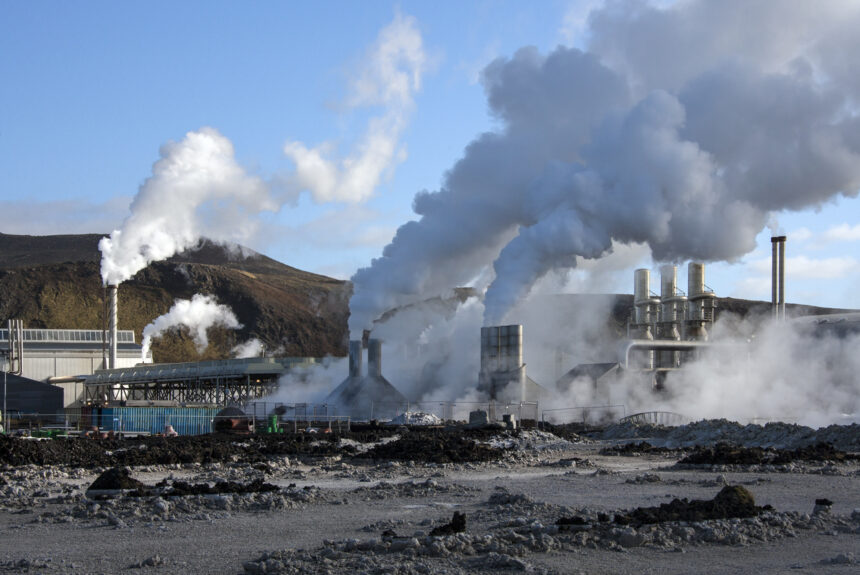Fervo Energy is breaking new ground, literally and figuratively, to bring abundant, reliable and clean power to the grid. In a recent presentation at Stanford University, the geothermal startup said it reduced drilling time by 70 percent and reduced costs from $9.4 million to $4.8 million per well. Innovation in advanced geothermal could generate affordable, emissions-free energy in the U.S. and around the world. Policy needs to keep up so that such a promising alternative energy source is not stuck in red tape.
>>>READ: Fervo Energy Announces Combined Geothermal and Direct Air Capture Plant
Traditional geothermal systems use heat and water close to the surface, like hot springs, along with natural fractures in the earth. Advancements in smart extraction technologies have increased the potential for geothermal power by drilling thousands of feet deep to access the hot rock deep underneath the Earth’s surface. Fervo, for instance, has drilled down more than 9,000 feet, and reduced its drilling time from 71 days to 21 days, despite drilling more than 2,100 feet deeper over the three weeks.
Trey Lowe, Chief Technology Officer of Devon Energy, remarked, “Fervo’s drilling improvements are like the early days of the shale revolution. When you operate continually and understand the resource, you dramatically streamline operations. That’s the unique value of Fervo’s approach to enhanced geothermal.”
Much like the shale revolution, advanced geothermal could offer similar economic, environmental and energy security benefits. Geothermal projects require a diverse workforce ranging from engineers and geologists to construction workers and technicians. Hot rock geothermal is reliable and available around the clock, making it an ideal candidate for clean, constant power generation. The potential for more reliable, low-cost electricity will save families money and make the U.S. a more attractive place to do business.
Like the emissions savings in the power sector from coal to natural gas switching, increased use of geothermal could result in significant emissions reductions. Google has been an early customer for advanced geothermal, partnering with Fervo as part of its commitment to power its data centers and campuses with emissions-free electricity 24/7. In addition to the emissions benefits, geothermal power plants have a small physical footprint and can be integrated into existing infrastructure, minimizing disruption to ecosystems and landscapes.
Legislative reforms are necessary to ensure that the policy keeps up with the rapid pace of innovation. Encouragingly, there has been notable action on this front. Most recently, Representative Young Kim (R-CA) introduced the Harnessing Energy at Thermal Sources (HEATS) Act. The bill would ensure that no federal permit is necessary for geothermal projects on state and private lands, underscoring that state environmental requirements are sufficient for public health and safety. This is important because one of the fundamental reasons the shale revolution was as successful as it was, including a strong environmental record, is that states largely oversee fracking regulation.
>>>READ: Fervo’s Milestone Heats Up the Race for Clean Energy Innovation
Additionally, Rep. John Curtis (R-UT) recently introduced the Geothermal Energy Opportunity (GEO) Act. The GEO Act would require the Department of Interior (DOI) to continue authorizing project leases unless a federal court vacates that lease. As Rep Curtis’s office explained, DOI “is holding up projects that already have a Record of Decision due to the Department’s alleged fear of litigation. In other words, after a company has spent substantial time and resources getting a project permitted, Interior is still withholding notices to proceed, drilling permits, and other authorizations because of litigation threats against a project.” Excessive litigation and even the fear of litigation has been a major obstacle to clean energy innovation and technological advancements. While other legislative reforms are necessary to curb protracted lawsuits, the GEO Act is a welcome step in the right direction.
Yet another geothermal bill that recently advanced out of the Natural Resources Committee is H.R. 6474, introduced by Rep. Michelle Steel (R-CA) and Rep. Susie Lee (D-NV). The legislation would amend The Energy Policy Act to create a more efficient permitting process for geothermal projects on previously studied or developed areas. Effectively, the bill would include geothermal technology for categorical exclusions under the National Environmental Policy Act, putting it on equal footing with oil and gas projects.
Both the private sector developments and public policy leadership on geothermal is encouraging. Whether or not advanced geothermal is the next shale revolution remains to be seen. Getting Washington out of the way will give it a much better chance.
The views and opinions expressed are those of the author’s and do not necessarily reflect the official policy or position of C3.
